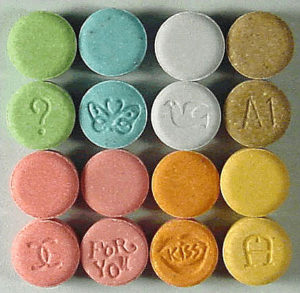The words of your elementary school teachers may echo in your ears whenever you hear something related to the War on Drugs. “Drug free is the way to be,” and, “Just say no to drugs,” they said. Those teachers may be surprised to find out that veterans of actual war may benefit from the use of an illicit drug. MDMA, better known as ecstasy, is an aptly-named drug that typically evokes feelings of happiness, empathy, and love in a user’s mind. Its enjoyable effects, when used during psychotherapy sessions, have found encouraging results in clinical trial use as a way to treat patients with post-traumatic stress disorder (PTSD).
PTSD is an anxiety-based mental disorder brought on by a person who has experienced trauma, such as abuse, war experiences, or car crashes. There is no cure for PTSD, so those affected can suffer from symptoms like being depressed, feeling “on edge” constantly, and having nightmares for the rest of their lives. Symptoms can be helped with antidepressants and forms of psychotherapy (for example, talking about the trauma as a form of exposure therapy), but some are “resistant” to these common forms of PTSD treatment, meaning that their symptoms do not readily improve, or resist change. MDMA-enhanced psychotherapy was intended for use as an alternative for “treatment-resistant” patients, who were not helped by medication or therapy. After all, what feeling could be more opposite of anxiety than ecstasy?

This rationale was used when MDMA was first explored in psychotherapy from the 1970s to the mid-1980s. When taken, MDMA quickly increases the amount of “feel good” chemicals within the brain, such as serotonin and dopamine, with its ecstatic effects lasting for hours. These same chemicals are also released after exercise, which is why you may experience a “runner’s high” after going for a jog. Putting a subject into a positive and loving sense of mind by giving them a dose of MDMA is thought to help the subject relax and open up about his or her experiences while in the safe environment of a therapist’s office. Unfortunately, in 1985 it was classified as a Schedule I illicit substance, defined as a drug with no medical value and high risk of abuse, during the War on Drugs. With such a short window of time to have explored the potential of MDMA as a therapeutic tool, clinical researchers are now clamoring to bring MDMA studies back.
The Multidisciplinary Association for Psychedelic Studies (MAPS) sponsors current trials, the first of which began in 2004 with treatment-resistant patients, publishing with positive results in 2010. The most startling improvement was seen in patients’ Clinician Administered PTSD Scale (CAPS) scores over time, which gives a numerical score to symptom severity. The higher the CAPS number, the more intrusive the symptoms are in a subject’s life. Of the patients treated with both therapy and MDMA, 5 out of every 6 patients strongly reduced their CAPS score after treatment. Only 1 out of every 4 patients treated with therapy and placebo experienced the same benefit.
Later, placebo-treated patients were given the option to try MDMA therapy. Of those who opted to participate, 100% cut their already improved CAPS scores in half or more. Not only were patients’ symptoms greatly alleviated, but the effect was lasting: the CAPS scores remained low for as long as 6 years following their last MDMA therapy session. Over 80% of all participants improved to the extent that they no longer even met PTSD criteria.
This study’s success has made the path to future MDMA exploration smoother – five clinical studies are ongoing in the United States, Israel, and Canada. More are being planned across the globe. You can even read an Ask Me Anything thread from a retired US Army Sergeant divulging their experiences with this treatment on Reddit. Use of MDMA remains illegal for use outside of FDA-sanctioned studies, but now the millions of people suffering from PTSD have a better chance of finding happiness.
Edited by Kayleigh O’Keeffe
Follow us on social media and never miss an article: